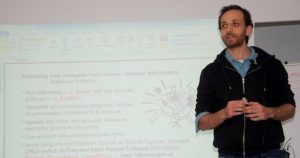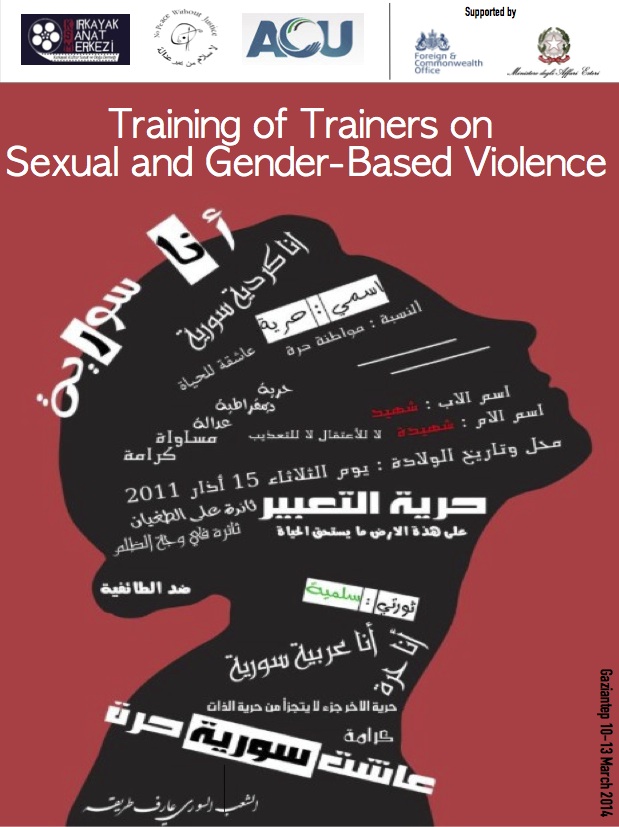“Often women are scared to say anything. They think they will be marginalised by their community and have no source of income,” said one doctor from the Dummar suburb of Damascus, as reported by irinnews.org, the news service of the UN Office for the Coordination of Humanitarian Affairs. “They think about their families and their children and decide that it is better to suffer in silence.”
Breaking the silence and facilitating the investigation of cases of sexual and gender-based violence was one of the main aims of the SGBV Training of Trainers held between 10-13 March 2014 in Gaziantep, Turkey. The training was organised by No Peace Without Justice in partnership with Kirkayak Art Center and the Assistance Coordination Unit with the support of the Foreign and Commonwealth Office and the Italian Ministry of Foreign Affairs.
Sexual and gender-based violence continues to be an under-reported but devastating crime committed during conflict and peacetime alike. One of the most important things the international community can do to try to stop this is to help and support the monitoring and documentation efforts of Syrian activists and NGOs working on the ground in Syria and in neighbouring countries. Alongside this support is assistance in building up an accountability system, ensuring perpetrators face justice and the experiences of women and children are not forgotten in the post-conflict world.
Alongside this wider and longer-term aim, the training of trainers had two specific goals. First, to build the capacity and increase the knowledge and skills of participants as human rights defenders on SGBV‑related issues. Second, to enable participants to duplicate these trainings within their local communities inside Syria, raising awareness directly among those who are experiencing violence and human rights violations in the daily tragedy of war.
The training of trainers on SGBV provided an analysis of the existing legal framework and monitoring mechanisms on sexual and gender-based violence, examining the practical situation on the ground and the needs within Syria, with a view to helping these activists and their networks work effectively on the ground. Presenters and participants engaged in the practical analysis of case studies, in order to simulate the implementation of international humanitarian and human rights instruments and their national equivalents.
The course paid particular attention to the development of interviewing skills, in order to collect all the useful information from witnesses and survivors to help build up concrete legal cases. The presenters underlined the absolute need for basic and precise information on crimes and on possible perpetrators, stressing at the same time the need to gather this information from witnesses or survivors without creating further trauma and treating them above all as human beings.

Part of the agenda focused on digital security awareness for the collection and storage of sensitive and delicate documents and data in a safe, secure and private way. This is essential to safeguard the life of investigators, activists and sources, who are the only actors that can lead effectively to a justice that can ensure accountability for the perpetrators of SGBV crimes and violations.
NPWJ’s Syria Project on Justice and Accountability
This four-day training course is part of an NPWJ project aimed at reducing the expectation and rewards of impunity and at building a culture of accountability. The purpose is to equip citizens to demand accountability and justice for violations taking place on a daily basis for the past two and a half years and, at the same time, to equip the judiciary and legal profession to answer that demand. The mainstay of the project is a series of advocacy and training events, which are being held in Gaziantep, Turkey, near the Syrian border, with Syrian judges, lawyers and civil society activists from Syria who can bring the skills and (perhaps more importantly) aspirations for justice back to their work and their constituents inside Syria. The long-term goal of this project is to promote democracy and human rights protection through incorporating justice and accountability in decision-making on conflict resolution and stability, development, and reconstructing planning in Syria. The project’s strategic objective is to support Syrian civil society playing an active role on justice and accountability issues, including advocacy and documenting human rights violations, including receiving, gathering, collecting, collating, processing and securely storing information, documentation and materials and analyse it for the purpose of establishing what happened and reconstructing decision-making processes that resulted in violations international humanitarian and human rights law in Syria since March 2011.
Documentation:
- Download the report on the “SGBV Training of Trainers“
Recent events
- International Women’s Day, Gaziantep, Turkey 8 March 2014
- Training course on “Forensic Investigations of Cases of Political Violence and the Disappeared for Syria”, Gaziantep, Turkey, 11-14 February 2014
- Training “#SGBV in #SYRIA – looking at Sexual and Gender-Based Violence”, Gaziantep, Turkey, 28 January-2 February 2014
- Commemoration of the Queiq River Massacre, Istanbul, Turkey 29 January 2014
- Training Course on “Digital Security – digital resistance”, Gaziantep, Turkey 14-16 January 2014
- Training course on “Documenting Violations Against Women”, Gaziantep, Turkey, 9-12 December 2013
- Training Course on “Forensic Investigations of Cases of Political violence”, Gaziantep, Turkey, 25-29 November 2013
- Side event on “Accountability for Syria”, The Hague, 12th ASP to the ICC, 23 November 2013
- Training course on “Chemical weapons awareness and documentation”, Gaziantep, Turkey, 7-12 October 2013
For further information, contact Hadi Al-Khateeb on hadi@npwj.org or Nicola Giovannini on ngiovannini@npwj.org or +32-2-548-3915.




